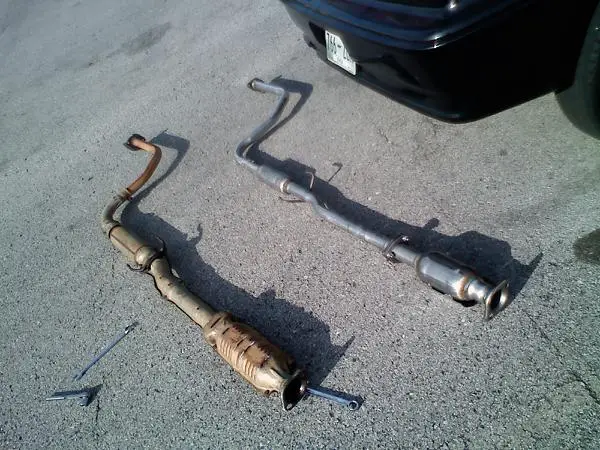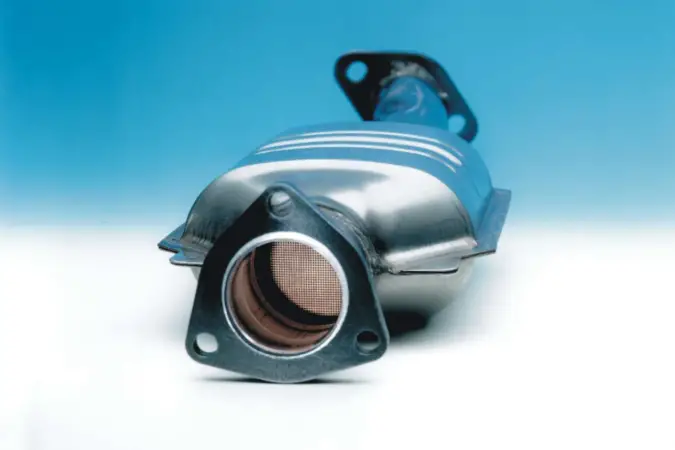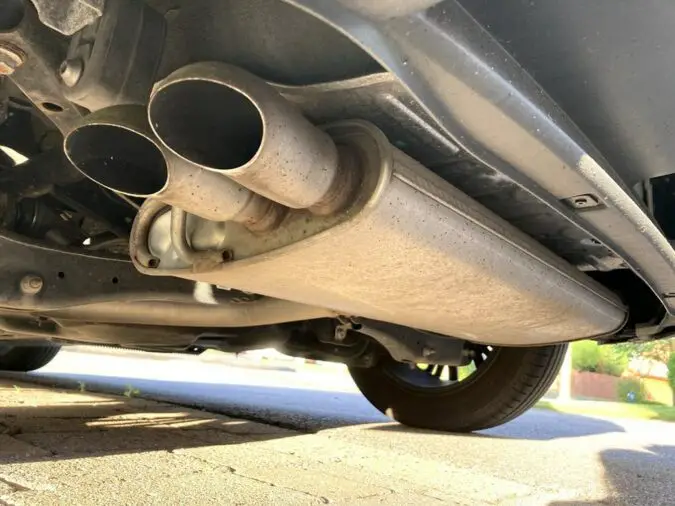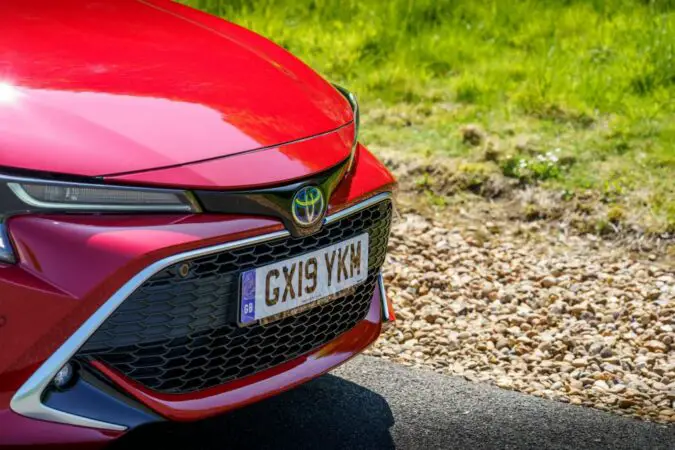Theft of catalytic converters is increasing across the country. This anti-pollution device can be stolen in a matter of minutes. The valuable metals it holds can be sold to scrap metal dealers for hundreds of dollars (given the high catalytic converter scrap value). So which cars are most likely to have catalytic converter stolen and should you take any precautions to prevent catalytic converter thefts?
So what exactly are catalytic converters, and why are thieves trying to make fast cash suddenly interested in them? Catalytic converters, found in the exhaust system, purify an engine’s pollutants whether it is driven by gasoline or diesel. Since 1975, the federal government has required them for all new vehicles.
The National Insurance Crime Bureau (NICB) reports that the three valuable metals inside catalytic converters—palladium, rhodium, and platinum—have caused a sharp increase in catalytic converter theft (perhaps, what you need is the best catalytic converter anti-theft device or a catalytic converter cover and an F-150 catalytic converter protector, as well as knowing the signs of missing catalytic converter).
We have identified the vehicles that have the highest chance for their catalytic converters to be stolen using information gathered by the NICB and service reports from auto repair facilities across the nation.
- Catalytic Converter Theft
- Most Stolen Catalytic Converters
- Easiest Catalytic Converters To Steal
- Most Expensive Catalytic Converter
- Driving Without A Catalytic Converter
- Catalytic Converter Theft Prevention
- Final Conclusion
- FAQs
Catalytic Converter Theft
In case you hadn’t heard, cars aren’t the greenest machines. A catalytic converter is a part of the exhaust system of your car that works to lower vehicle emissions. It does this by reducing the number of harmful gases and other pollutants that an internal combustion engine vehicle releases into the atmosphere.
Catalytic converters generally became the norm in the 1970s. Your car will have at least one catalytic converter, depending on the type of vehicle.
Nearly 14,500 catalytic converters were stolen nationwide in 2020, and that number increased to 50,000 in 2021, according to the National Insurance Crime Bureau (NICB). Hence, the importance of learning how to prevent catalytic converter theft. Speaking of, go check out our explainer on does insurance cover catalytic converter theft.
According to State Farm, the nation’s largest motor insurer, nationwide claims for stolen catalytic converters (which you can note by the missing catalytic converter sound and how to tell if a catalytic converter is missing) totaled 43,219 from July 2021 to June 2022. This is a 109% rise over the same time the year prior (in particular, concerning the Hyundai Sonata catalytic converter theft).
On November 2, the Justice Department announced the dismantling of a multimillion-dollar national catalytic converter stealing network. Officials declared that they will seek $545 million in forfeitures from people detained during the operation, including cash, luxury cars, and real estate. For more insight, check out our guide on why do they steal catalytic converters.
Catalytic Converter Cost
The NICB estimates that replacing a catalytic converter can cost between $1,000 and $3,000. This sum excludes lost wages and the expense of acquiring alternate transportation. The make, model, and location of the car all affect how much it will ultimately cost to replace the catalytic converter
Catalytic Converter Location
The catalytic converter is located in the exhaust system of an automobile between the muffler and the engine on the vehicle’s bottom. It is typically found near the rear of the car. Its diameter is larger than that of the exhaust pipe.
Each vehicle will have a different exact location (to learn more, check out our guide on where is the catalytic converter). It is always located somewhere between the muffler and the exhaust manifold, though. While the original is welded into place by the manufacturer, replacements are generally clamped on.
Reasons For Catalytic Converter Theft
There are two basic reasons why catalytic converters are stolen. The first is that they are very simple to steal (this explains why do people steal catalytic converters). This fact attracts lazy burglars who lack the skills necessary to plot bank heists or break into safes (or even know how to break into your car). It only requires a few minutes, basic tools, and ability.
This makes the converters an appealing deal when combined with the price of the precious metals they are made of, which include palladium, platinum, and rhodium. These precious metals are now even more expensive than gold due to their skyrocketing price. That explains why catalytic converters are so valuable.
The second thing is that it is quite simple to sell it to a scrap metal buyer or junkyard or even to hawk it on the illicit market. Given the high value of scrap metal (and the Chrysler catalytic converter scrap price and Chrysler 300 catalytic converter scrap price, as well as Chrysler Town and Country catalytic converter scrap price, and the 2005 Ford F150 catalytic converter scrap price), a few minutes spent underneath your car could result in a big payday for the burglar.
Most Stolen Catalytic Converters
Although catalytic converters have significantly decreased pollution, they have also brought up a new issue because they are now a target for thieves. Catalytic converters are expensive and relatively simple to steal. This explains why catalytic converters are being stolen and why are people stealing catalytic converters.
Since they have become popular targets for criminals trying to make a quick profit. In light of this, let’s look at some of the vehicle models that catalytic converter thieves most frequently target (this helps to explain why catalytic converter theft is a thing).
Which Cars Are Most Likely To Have Catalytic Converter Stolen #1. 1985–2021 Ford F-series
Given that it has been Ford’s cash cow since its launch, the F-Series is undoubtedly its best vehicle. The F-Series has long been one of the best-selling cars in the US because it combines practicality, affordability, reliability, and off-roading qualities.
It shouldn’t be surprising that the most popular car in North America is also the one that catalytic converter thieves most frequently target. There are a lot of Ford F-series pickup trucks parked in driveways and garages around the nation because there are millions of them on the road.
The F-series is frequently targeted for strictly practical reasons, including the fact that it rides higher off the ground than the average car. Hence the catalytic converter can be removed from an F-series vehicle more quickly and easily by sliding under the vehicle.
Which Cars Are Most Likely To Have Catalytic Converter Stolen #2. 2001–2021 Toyota Prius
Currently, hybrids are dominating the market. Today’s fastest supercars are hybrids, and the majority of brands offer hybrid options. However, in 2001, the Toyota Prius was the sole hybrid available for purchase.
When the Prius was introduced, it caused quite a stir because of its unique design and hybrid drivetrain. Although many gearheads first detested the Prius, it has won over fans and is now one of Toyota’s most well-liked cars.
When it comes to catalytic converter theft (and it does help to have a DIY catalytic converter protection), the Toyota Prius, particularly the second-generation model built from 2004 to 2009, is quite alluring. This is partially explained by the fact that the internal combustion engine of the gasoline-electric hybrid powertrain doesn’t operate as hotly as it would if the powertrain’s accompanying electric motors weren’t present.
Ironically, given its reputation for being environmentally benign, this meant that more precious metals were required in the catalytic converters used to purify the cooled exhaust of the Prius (this was lessened in the third-generation model – you can learn more in our guide on what are catalytic converters made of).
According to NICB, hybrid cars like the Prius exert less strain on their catalytic converters, thus even after many years of use, these cars’ cats are still extremely valuable. A quick Google search can tell you how high the Prius catalytic converter price can be (with a bit of help from a free catalytic converter price app).
Which Cars Are Most Likely To Have Catalytic Converter Stolen #3. 1989–2020 Honda Accord
It’s not surprising that the Honda Accord is a top target for catalytic converter thieves given the millions of them already on American roadways. The Honda Accord has been one of the best-selling mid-size cars for decades. It’s partly exacerbated by the high price of a Honda catalytic converter.
The Accord is frequently praised for its responsive handling and fuel-efficient four-cylinder engine. However, criminals are more grateful for the fact that taking a catalytic converter only requires a small reciprocating saw and only takes a few minutes.
Which Cars Are Most Likely To Have Catalytic Converter Stolen #4. 1990–2022 Ford Econoline/E-Series
Call it a sensible workhorse that keeps taking on challenging duties or the work van that time forgot. Full-size vans in the Econoline family have been manufactured since the 1960s in a variety of configurations.
The Econoline may not draw attention when driving, but for decades it has served as a reliable workhorse for thousands of fleets all throughout the nation.
It is still available, but only in cutaway chassis form for fleet use and in E-350 or E-450 versions. Given its popularity and the fact that its owner rarely takes the Econoline home, it makes an ideal target for thieves. A long day’s labor stealing catalytic converters can result in thousands of dollars in unsavory gain (to learn more, check out our guide on why are they stealing catalytic converters and why steal a catalytic converter).
Which Cars Are Most Likely To Have Catalytic Converter Stolen #5. 2007-2017 Jeep Patriot
The Compass and the Patriot are two small crossover SUVs that Jeep released to the public in 2006. Although they shared the same GS chassis, the Patriot only provided a four-wheel-drive system, which helped to distinguish it from the other vehicles.
The Jeep Patriot was never recognized for its straight-line speed and was only offered with four-cylinder engine options that produced relatively low power output. Although we referred to it as “no joy ride,” many customers found the Patriot’s traditional upright Jeep design and inexpensive pricing to be appealing.
Despite being phased out in 2017, the Jeep Patriot was a major success, selling nearly 2 million units in just ten years. Since the majority of them are still in use today, criminals are still interested in their catalytic converters. The Patriot ranks on this list, proving that the small Jeep’s catalytic converters are an appealing piece for thieves (once you understand why do catalytic converters get stolen).
Which Cars Are Most Likely To Have Catalytic Converter Stolen #6. 1999–2021 Chevrolet Silverado
Pickup trucks like the Chevrolet Silverado are excellent for transporting and towing as well as navigating rough terrain. Similar to the Ford F-150, the Silverado’s additional ground clearance makes it simpler for thieves to crawl beneath this full-size pickup and take its catalytic converter.
In order to succeed in the 21st century and replace the well-liked C/K pickup truck, Chevrolet needed a new pickup vehicle in the late 1990s. The Silverado was debuted by Chevy in 1999 after several years of development.
The Silverado has had great growth in popularity and is today among the most well-liked pickup trucks in the US, much like the C/K. Unfortunately, the Silverado is a popular target for catalytic converter thefts, just like the F-Series (for more insight, check out our guide on the F-150 catalytic converter anti-theft and how to know if catalytic converter is stolen).
The Silverado has been offered with a variety of four, six, and eight-cylinder engines over the years. The choice is excellent for truck buyers. However, catalytic converter thieves find it just as attractive.
Which Cars Are Most Likely To Have Catalytic Converter Stolen #7. 1997–2020 Honda CR-V
When the Honda CR-V debuted for the 1997 model year, it contributed to the development of the compact crossover SUV segment. Despite the nameplate’s 25-year existence, the CR-V is still one of today’s best-selling SUVs. It obviously continues to enjoy popularity with the general public.
If only the CR-V could maintain its catalytic converters as long as it has maintained its client base. Unfortunately, thieves adore the CR-V for its relatively simple-to-snag cat. Although there are a number of products you can purchase to protect your CR-V’s catalytic converter from thieves, your best option is to always park it in a safe place.
Which Cars Are Most Likely To Have Catalytic Converter Stolen #8. 1987–2019 Toyota Camry
You’re likely to see a few Toyota Camrys if you’re driving on any US road. That’s understandable considering how popular this car has been for years. The Toyota Camry is a mid-size car with a solid reputation for reliability. The Camry has been available in sedan, coupe, wagon, and even convertible body styles over the years.
Although the Camry doesn’t provide particularly thrilling driving experiences, its usefulness, affordability, and reliability have maintained it at the top of the sales lists. It is simple to understand why thieves could target the Camry given its continued popularity.
Which Cars Are Most Likely To Have Catalytic Converter Stolen #9. 2011–2017 Chrysler 200
The Chrysler 200, which replaced the infamous Sebring, represented a substantial improvement in terms of appearance, comfort inside, and performance over its predecessor.
However, the 200’s patchy cabin quality and uneven steering effort didn’t much wow enthusiasts. Although the 2015 model of the 200 featured a more modern design and features, it also signaled the end of the car’s convertible body style.
Prior to its discontinuation in 2017, the 200 was produced for two generations and had considerable popularity. Although the 200 has been discontinued for five years, catalytic converter thieves still want to steal them.
Which Cars Are Most Likely To Have Catalytic Converter Stolen #10. 2005–2021 Chevrolet Equinox
Early in the new millennium, as sales of tiny crossover SUVs began to soar, Chevrolet realized it couldn’t fall behind. Chevy thus launched Equinox in 2004 to take advantage of the demand.
The five-seater SUV Equinox from Chevy has seen numerous iterations over the years, with the most recent version enhancing its predecessor’s most user-friendly features.
It appears that the Equinox has won over admirers beyond those looking for a large and affordable small SUV. After selling over 3 million units, the Equinox is still going strong today and is in its third generation. Be careful to take proper care of Equinox’s catalytic converter unless you intend to purchase the forthcoming electric version of the vehicle.
Easiest Catalytic Converters To Steal
Every gas-powered vehicle produced after 1975 must have a catalytic converter. They are therefore abundantly present in cars all around. This indicates that the majority of the vehicles on the road may be in danger. However, there are a few distinct car types whose catalytic converters are more frequently stolen.
To begin with, because they are simpler to reach, vehicles with high clearance (such as SUVs) are more likely to be cannibalized for precious metals. Hybrid vehicles, such as Toyota Priuses also have recently become particularly vulnerable to catalytic converter theft (especially the most common catalytic converters stolen).
Why? The catalytic converter is typically in better shape than it is in other cars because the vehicle doesn’t rely as heavily on it (this also explains why are catalytic converters stolen).
1. Low-Emissions Vehicles
Low-emission cars are made with extremely efficient filtering systems, which entail superior catalytic converters. For better functionality, their catalytic converters frequently contain more platinum, rhodium, and palladium than regular-emissions vehicles.
A robber who sells to a scrap yard will make more money the more concentrated these expensive precious metals are, which can be tracked with a catalytic converter by VIN number. The Toyota Prius, a popular low-emissions vehicle, is the one that encounters the most catalytic converter theft (especially cases of catalytic converter theft in Texas).
The owner of a Prius manufactured in 2009 or before should exercise extra caution because older models contain more of that precious metal than newer versions. The earnings from stealing a Prius catalytic converter could be even double compared to the value of a normal catalytic converter.
For more insight, check out our guide on how much is a catalytic converter.
2. Trucks And SUVs
Thieves will also target higher vehicles like pickup trucks and SUVs as opposed to smaller cars like Priuses. Some of the easiest catalytic converters to steal are found in these vehicles.
SUVs benefit from higher ground clearance in addition to having expensive catalytic converters. This makes it simpler to get in and out fast because these vehicles have more than enough space for a person to climb underneath without requiring a jack (to find out more, check out our explainer on the Ram 1500 catalytic converter location and how many catalytic converters are in a Dodge Avenger). Due to this reason, pickup trucks in general will also experience the same problems.
3. Routinely Parked Cars
In addition to the car’s physical build, how you drive and park your vehicle could also affect your risk of theft. Your vehicle is significantly more likely to be broken into if you frequently leave it parked in the open. This is especially true if you follow a set daily schedule, for work or school.
Most Expensive Catalytic Converter
One thing and one thing alone makes catalytic converters notorious: they are exceedingly expensive to replace. In actuality, the catalytic converter is the most expensive single part in the majority of cars. You may be wondering how much does a catalytic converter cost. Here is a brief summary of what vehicles have the most valuable catalytic converters.
According to J.D Power, the Ferrari F430 reportedly had the most costly catalytic converter, with a whopping $3,770 price tag. In addition, the F430 requires two of these, costing $7,540 excluding labor for a complete replacement.
The cat-converter for the Lamborghini Aventador is officially the third most expensive, at $3,120. But they ranked it second because, like the F430, it needs two converters. The total cost of replacement now stands at $6,240.
If you can afford a Ferrari or a Lamborghini, you can probably afford a catalytic converter at any price, which almost goes without saying.
Although it is not as special as a Lamborghini or a Ferrari, the car with the second (or third) most expensive catalytic converter has a highly well-regarded vehicle line. The Ram 2500, which costs $3,460 for a catalytic converter, has that distinction.
The Ford F-250, which has the fourth most costly catalytic converter, will cost drivers $2,804, which is actually a big discount from the top three. The Ford Mustang rounds out the top five with a comparatively low price tag of $1,500.
Depending on the type and model of the car, the average catalytic converter costs between $800 and $1,200. In general, the bigger the engine the more the cost of the converter. Remember that this is only the cost of the converter unit. Labor costs and additional exhaust parts if necessary may increase the overall cost of repair.
Driving Without Catalytic Converter
It’s crucial to take action right away if your catalytic converter has been damaged or stolen. Although it is possible to operate the car without one, it is not recommended. Long-term effects of driving without a catalytic converter or with a malfunctioning one include engine shutdown, which is the worst-case scenario.
Watch out for the signs of a bad catalytic converter as well as changes in how your car drives if you suspect that your catalytic converter may be taken. Several indicators that your catalytic converter might be damaged include the ones listed below.
Signs Of Stolen Catalytic Converter
- Check engine light displayed on the dashboard
- Black smoke plumes coming from the exhaust pipe
- Loud noises, especially when accelerating or starting the engine
- Unexpected drop in fuel efficiency
- Starting troubles
- Difficulty in accelerating
Inspect your exhaust system as soon as you discover these signs. Hence you can make sure that your car receives the necessary replacement parts before the issue gets worse. Additionally, it can spare you from future hassles such as failing an inspection or emissions test, or, worse, a total engine failure.
It’s worth noting that these symptoms can also be familiar for those cars whose catalytic converters aren’t actually stolen. Rather, these signs are familiar with clogged catalytic converter symptoms. In this instance, there are ways where you can figure out how to fix a catalytic converter without replacing it.
Otherwise, knowing how to unblock a catalytic converter can be done as simply by using a catalytic converter cleaner. Even DIY solutions such as using a lacquer thinner as a catalytic converter cleaner also work well. If simple fixes and cleaning won’t work, you might have to replace the cat converter altogether.
The price of a new catalytic converter is unfortunately fairly steep (for more insight, check out our guide on replacing catalytic converter with flex pipe, as well as the Ford V10 motorhome catalytic converter), as we mentioned earlier. Depending on the make and model of the vehicle, a typical catalytic converter replacement cost will easily run into thousands (as with a Volvo catalytic converter). If you’re prepping a track car, you might as well take that opportunity to install a high flow catalytic converter, instead.
Catalytic Converter Theft Prevention
You should take every precaution to keep your catalytic converter from being taken given how frequently they are stolen. There are a few easy techniques to stop the catalytic converter in your car from being stolen. Removing the catalytic converter can be simple and the thief must have access to your car for a brief period of time in order to steal it.
A mechanic can install an aftermarket catalytic converter theft prevention device for a price. This anti-theft mechanism, which often takes the form of a shield or cage, makes it more difficult to remove the converter.
Your neighborhood auto parts store might be able to help you out if your mechanic doesn’t have one on hand. Although these systems deter theft, your car insurance won’t often pay for their installation.
Additionally, you should consider parking your vehicle in areas that are more secure. When possible, police departments suggest parking in closed garages. If that isn’t an option, try parking in a place that is well-lit, reasonably crowded, or has security cameras. This is so that criminals won’t be able to steal your converter covertly.
Avoid leaving your car in commuter parking lots. Thieves may be aiming to hit a large number of vehicles in one lot at once since they know that automobiles there will be left unattended for the entire day.
Some automobile owners also engrave their VIN (Vehicle Identification Number) on the converter itself. This is in order to facilitate the return of a stolen catalytic converter to its rightful owner following an unsuccessful attempt at resale. The enacting of catalytic converter theft laws also helps.
In Conclusion…
A catalytic converter is a crucial part of a car’s exhaust system. Because they are simple to steal and their components can be sold for high prices, they are frequently stolen. Priceless metals like platinum, rhodium, and palladium are found inside the catalytic converters. Hence they are targets for thieves who profit by selling the parts to scrapyards or metal recycling facilities (once they’re aware of the Dodge catalytic converter scrap price).
Thefts of catalytic converters are frequently crimes of opportunity. However, many criminals target particular vehicles. This is based on the cost of the catalytic converter, the abundance of the model, and the ease with which the catalytic converter may be accessed. Some owners face a higher risk, particularly if they drive a hybrid vehicle or a huge pickup truck.
Now that you know why catalytic converters are stolen (which could be helped by learning how to find a tracker on your car or how to find an AirTag in my car and how to track a car) and what you can do to stop it, you should be able to prevent it. These safety measures are not infallible, though. The risk of car theft is just one of many that come with owning a vehicle.
Frequently Asked Questions
Why Do People Steal Catalytic Converters
Catalytic converters are popular targets for theft since they are simple to steal and the materials inside can be sold for high prices. Valuable metals like platinum, rhodium, and palladium are used in catalytic converters to catalyze chemical reactions. Catalytic converters are targeted by thieves because of these valuable materials. They can profit by selling the pieces to scrapyards or metal recycling facilities.
What Is A Catalytic Converter
A catalytic converter is an exhaust pollution control device. converts toxic pollutants in the exhaust gas from an internal combustion engine into less dangerous ones. Precious metals like platinum, palladium, and rhodium, which function as catalysts, are found in catalytic converters. Toxic gases like carbon monoxide and hydrocarbons are present in exhaust gases. The catalyst aids in oxidizing them into less dangerous carbon dioxide.
What Does A Catalytic Converter Do
A catalytic converter is an essential component of a car’s exhaust system. Fuel is used by a car’s engine, which is converted into dangerous gases including carbon monoxide and nitric oxide. Before being released through the exhaust pipe, the catalytic converter converts these dangerous pollutants into carbon dioxide and water through a series of chemical reactions.
How Much Is A Catalytic Converter
Depending on the vehicle’s make and model, the typical catalytic converter costs between $800 and $1,200. Generally speaking, the converter’s price increases with engine size. Remember that these costs only cover the price of the converter
Do All Cars Have Catalytic Converters
Every car on the road is equipped with a catalytic converter. Since 1975, they have been compulsory, making every car a possible target for thieves. However, the construction of some cars may put them at a higher risk.
Which Cars Are Least Likely To Have Catalytic Converter Stolen
The likelihood of a catalytic converter being stolen from a car is far lower if it is installed in the engine compartment. Catalysts are often less valuable for many American and Asian auto companies. You can also purchase a car that is old, electric, or diesel and comes without a catalytic converter.
Does Insurance Cover Catalytic Converter Theft
Theft of a catalytic converter is normally covered if you have comprehensive coverage on your auto insurance policy. Catalytic converter replacement and related damage repair are frequently covered under comprehensive insurance.
Can You Drive A Car Without A Catalytic Converter
In general, driving a car without a catalytic converter is feasible. Your car can run without a catalytic converter in most situations. However, the catalytic converter does improve the performance and efficiency of your vehicle. It does this by filtering the dangerous gases your engine produces into significantly less harmful ones.
What’s Inside A Catalytic Converter
A ceramic component covered in different precious metals, such as palladium, rhodium, and platinum, is commonly found inside a catalytic converter. These are the so-called catalysts that start a chemical process to change dangerous gases into less dangerous ones.
Do Diesels Have Catalytic Converters
Yes, catalytic converters are found in almost every diesel engine produced since 1990. Most cars made before that period do not have one. Around that time, it became clear that diesel engines in particular required this technology to minimize pollutants. Some diesel engines use two-way catalytic converters with diesel oxidation catalysts. However, it may also have a three-way design with an SCR reduction.










